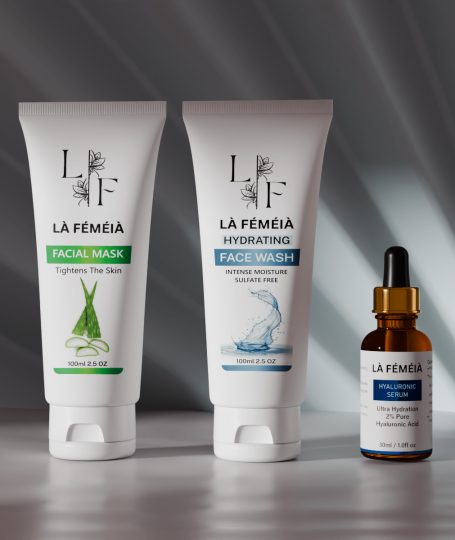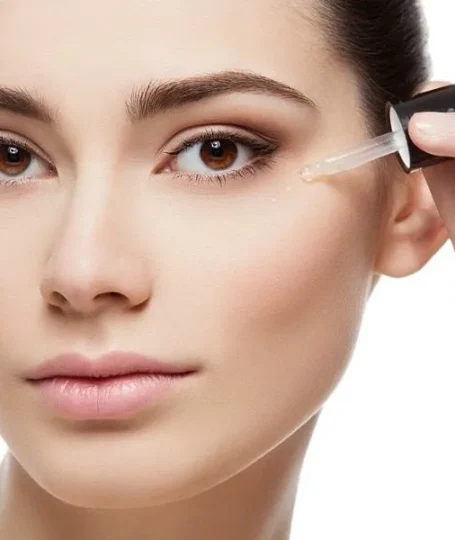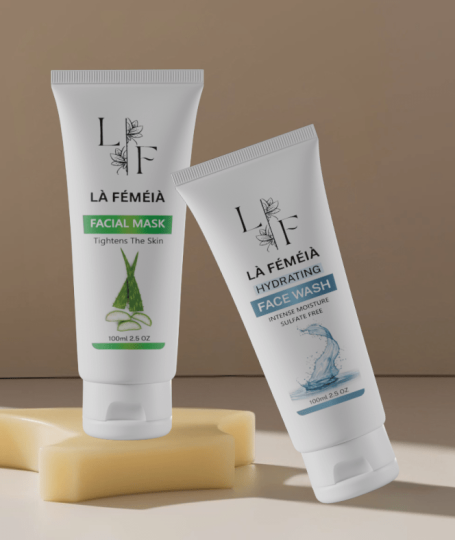No products in the cart.: ₨0.00
How Your Diet Impacts Skin Health — Diet & Skin Science

Introduction
You’ve probably heard it before: “You are what you eat.” Turns out, this old adage is more than just folklore—it holds real scientific weight, especially when it comes to how your skin behaves. Breakouts, dullness, dehydration, early signs of aging—they can all be influenced by your diet just as much as by the products you use. At La Féméia, while we focus on serums, creams, sunblocks, and skin rituals, we also believe true skin health starts from within.
In this article, we’ll dive into how different foods affect your skin, what to eat (and what to limit or avoid), and how you can pair smart nutrition with your skincare routine for glowing, resilient skin.
How Diet & Skin are Connected
Your skin is the body’s largest organ—it reflects internal health. Some ways diet impacts skin:
- Inflammation & Acne: Foods that raise blood sugar or insulin (like refined carbs) trigger inflammation. That inflammation can lead to acne and worsen existing breakouts.
- Antioxidants & Free Radicals: Pollution, UV rays, and stress produce free radicals that damage skin cells. Antioxidant-rich foods help your body neutralize those.
- Hydration & Barrier Function: What you eat (and drink) affects moisture retention and the skin barrier. If you’re dehydrated or missing essential fats, your skin may become dry, flaky, or irritated.
- Collagen & Aging: Collagen keeps skin firm and supple. Nutrients like vitamin C, zinc, and amino acids are essential in collagen production. Lack of these can speed up wrinkle formation.
Foods That Help Your Skin Glow
Here are foods you should aim to include regularly for better skin health:
- Fatty Fish (Salmon, Sardines, Mackerel): Rich in omega-3 fatty acids that reduce inflammation and support skin elasticity.
- Colorful Vegetables & Fruits: Berries, oranges, carrots, leafy greens—packed with vitamins A, C, E, antioxidants, and beta-carotene.
- Nuts & Seeds: Walnuts, flaxseeds, chia seeds—good sources of healthy fats and nutrients that strengthen skin barrier.
- Whole Grains & Complex Carbs: Brown rice, quinoa, oats—these provide sustained energy, avoid spike in blood sugar.
- Hydrating Foods: Cucumbers, watermelon, celery—help supplement your water intake.
- Probiotic Foods: Yogurt, kefir, fermented vegetables—support gut health, which in turn helps skin (less inflammation, better immunity).
Foods to Limit for Clearer Skin
To keep skin clear, hydrated, and youthful, it helps to cut back or moderate:
- High-Glycemic Foods: White bread, sugary drinks, sweets — can trigger acne or make it worse.
- Processed & Fried Foods: Often contain trans fats, unhealthy oils & high sodium.
- Dairy (if sensitive): Some people find dairy correlates with acne breakouts—pay attention to how your skin responds.
- Extreme Caffeine & Alcohol: These can dehydrate skin, disrupt sleep, and reduce nutrient absorption.
How to Combine Diet & Skincare for Best Results
Having the right skincare routine is great—but when paired with smart dietary habits, results often improve faster and last longer.
- Morning Routine Tip: After breakfast with antioxidants (like berries + yogurt), cleanse → serum → moisturiser → sunblock. For example, use a vitamin C or hydrating serum from our Serums collection, followed by sun protection from Skin Rituals.
- Hydration is Key: Drink enough water & include hydrating foods. Use a moisture-boost serum (hyaluronic acid) from La Féméia off and on throughout the day.
- Evening Repair: Eat a protein-rich dinner that includes nutrients needed for collagen repair (e.g. lean meats, legumes). After cleansing, use treatment serums (for acne, brightening, or night repair), then moisturise.
- Weekly Reset: Once or twice a week, do a skin ritual: exfoliate (if suitable), mask, then rich moisturiser + rest. Pair with high-nutrient meals those days.
Sample Meal & Skin Plan
Here’s a sample daily plan you could follow, keeping skin health in mind:
| Meal | Ideas | Skin-Friendly Highlights |
|---|---|---|
| Breakfast | Oatmeal with berries & nut butter + green tea | Antioxidants, healthy fats, low sugar spike |
| Snack | Cucumber slices + hummus / nuts | Hydration + good fats |
| Lunch | Grilled fish or chicken + mixed veggies + quinoa | Protein, omega-3, vitamins |
| Snack | Yogurt / kefir + a fruit | Probiotics + vitamins |
| Dinner | Lentil or chickpea dish + leafy salad + olive oil | Fiber, plant protein, healthy fat |
| Hydration | Water, coconut water, herbal teas | Maintain skin moisture internally |
Common Myths & Truths
| Myth | Truth |
|---|---|
| “Spicy food causes acne.” | Only sometimes—if it triggers inflammation in your body or you’re sensitive. Not universally true. |
| “Chocolate causes breakouts.” | Not directly. High sugar and dairy in some chocolate may affect some people, but dark chocolate in moderation is usually fine. |
| “You must take supplements for glowing skin.” | A balanced diet is usually best. Supplements can help where diet is deficient, but always consider whole foods first. |
FAQs
Q1: Can changing my diet really reduce acne?
Yes—while not all acne is diet-related, many people benefit when they reduce high-glycemic foods, limit dairy (if sensitive), and increase antioxidants. Combine with good skincare for best results.
Q2: How long until I see skin improvements from dietary changes?
Usually 4-8 weeks. Skin regenerates roughly every 28 days, so give your body time.
Q3: Do I need specific supplements?
Only if you have a documented deficiency (vitamin D, vitamin C, zinc, etc.). Prefer food sources first. Consult a healthcare provider.
Q4: Can I still use acne or brightening serums while improving my diet?
Absolutely! Using effective serums from La Féméia will complement dietary efforts. The two together often give better, more lasting results.
Conclusion
At La Féméia, we understand beauty isn’t just what you put on your skin—it’s also what you feed your body. When you pair mindful eating with a consistent skincare ritual, the results show up: clearer tone, better hydration, fewer breakouts, slower aging.
Start small—add more fruits and vegetables, stay hydrated, avoid extreme sugar & processed foods—and let your skincare (like our serums, creams, sunblock) do the rest.




